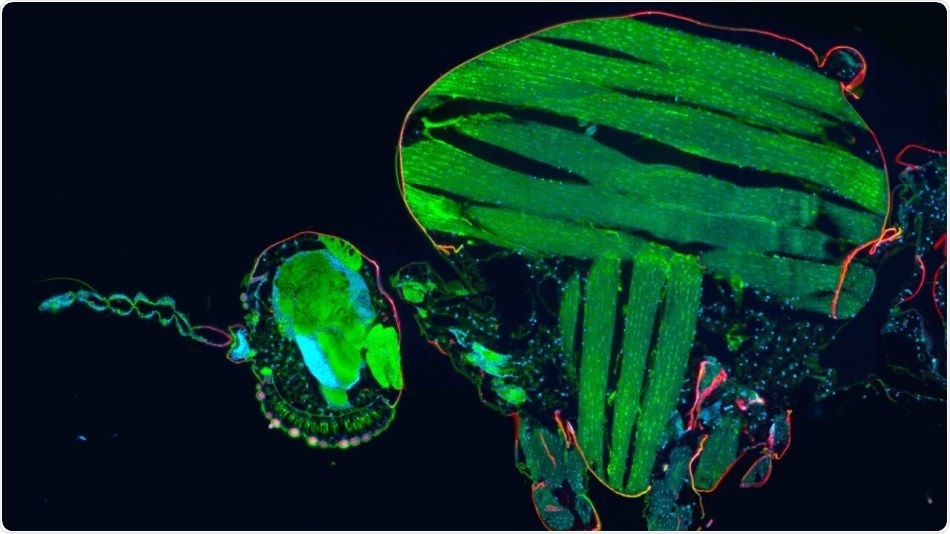The first cell atlas of mosquito immune cells recently created by researchers can help interpret how mosquitoes combat various infections, including malaria.

Image Credit: Gianmarco Raddi, Wellcome Sanger Institute.
The research team from the Wellcome Sanger Institute, Umeå University in Sweden, and the National Institutes of Health (NIH) in the United States, identified new kinds of mosquito immune cells, such as a rare type of cell that could play a role in restricting malaria infection. The team also discovered molecular pathways that are involved in regulating the malaria parasite.
These latest discoveries provide new possibilities to identify innovative ways to break the chain of malaria transmission and inhibit mosquitoes from spreading the malaria parasite to human beings. The study results were recently published in the Science journal.
Moreover, the cell atlas will serve as a useful resource for scientists attempting to interpret and manage other types of mosquito-borne diseases, like Zika or Dengue. The study results were recently published in the Science journal.
Malaria is known to be a life-threatening disease affecting over 200 million individuals around the world, and in 2018 alone, it led to around 405,000 deaths, the majority of which included children aged under five years.
Plasmodium parasites are responsible for causing malaria. These parasites generally spread through the bites of female Anopheles mosquitoes. The key to decrease the burden of malaria infection is to break the chain of transmission from humans to mosquitoes and vice versa.
The immune system of the mosquitoes regulates how the insects can transmit or tolerate viruses or parasites, but not much is known about the exact types of cells involved in this process.
In this latest detailed study of mosquito immune cells, a research team examined two types of mosquitoes—Aedes aegypti, which transports the viruses responsible for causing Chikungunya, Dengue, and Zika infections, and Anopheles gambiae, which transmits the malaria infection.
With the help of advanced single cell methods, the team examined over 8,500 individual immune cells to observe which kinds of genes were actually turned on in every cell and detect particular molecular markers for each type of unique cell.
They found that there were at least twice as many kinds of immune cell than had formerly been observed, and eventually applied the markers to detect and measure such cells circulating in the gut and other parts of the mosquitoes.
Later, the researchers effectively tracked how the Anopheles mosquitoes and their immune cells responded to infection with the Plasmodium parasite.
We have carried out the first ever large scale survey of the mosquito immune system, and using single cell sequencing technology we found immune cell types and cell states that had never been seen before. We also looked at mosquitoes that were infected with the Plasmodium parasite and for the first time were able to study their immune response in molecular detail, and identify which cells and pathways were involved.”
Dr Gianmarco Raddi, Study First Author, Wellcome Sanger Institute
An earlier research work conducted by the NIH team had demonstrated that the potential of the mosquitoes to transfer malaria could be reduced by a process known as “immune priming,” by stimulating the immune system of the mosquitoes to effectively combat against the parasite.
In the latest study, the team observed that one of the recently discovered types of immune cells contained high levels of a major molecule required for immune priming, and could play a crucial role in that process.
We discovered a rare but important new cell type we called a Megacyte, which could be involved in immune priming, and which appears to switch on further immune responses to the Plasmodium parasite. This is the first time a specific mosquito cell type has been implicated in regulating the control of malaria infection, and is a really exciting discovery. We now need to carry out further studies to validate this and better understand these cells and their role.”
Dr Oliver Billker, Study Joint Senior Author, Wellcome Sanger Institute
Dr Billker is currently based at Molecular Infection Medicine Sweden in Umeå University.
The team demonstrated that in response to the malaria infection, certain kinds of immune cells—called granulocytes— multiplied considerably, and showed that some of these cells could form into other immune cells.
The team also found that immune cells in the gut and other tissues of the mosquito are actively recruited into the circulation to combat infections after remaining dormant on the fat body of the mosquitoes.
The team has created the first mosquito immune cell atlas, to shed light on how mosquito immune systems fight infections. Mosquitos appear to have a sweet spot of immunity to parasites like malaria, with enough immunity to the infection that it doesn’t kill the mosquito but not enough to remove the parasite. This atlas offers a vital resource for further research, which could reveal ways to modify the mosquito immune response to break the chain of disease transmission.”
Dr Sarah Teichmann, Study Author, Wellcome Sanger Institute
Source:
Journal reference:
Raddi, G., et al. (2020) Mosquito cellular immunity at single-cell resolution. Science. doi.org/10.1126/science.abc0322.